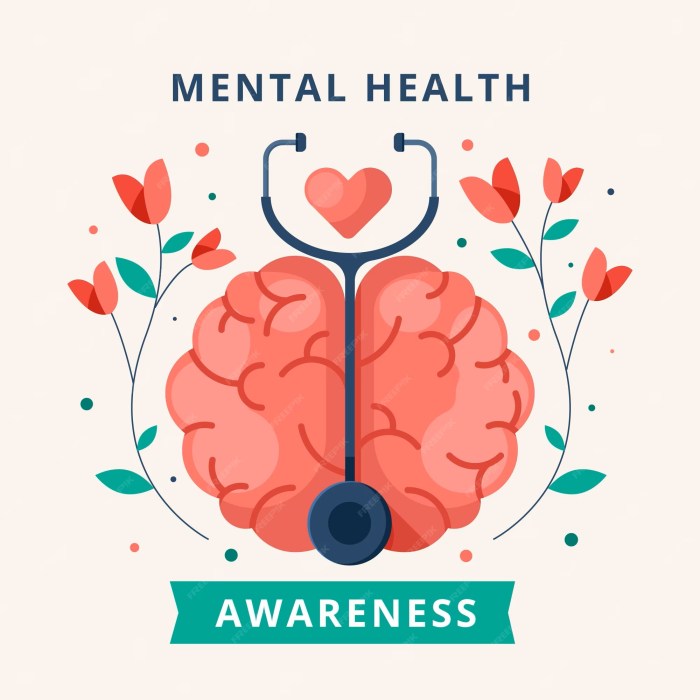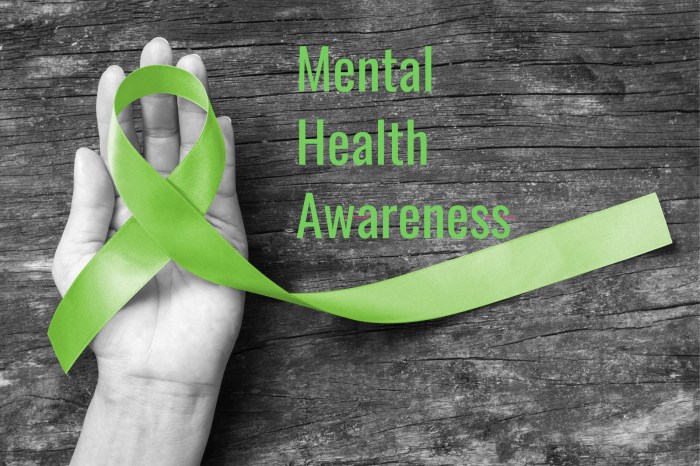Mental Health Awareness shines a spotlight on the importance of understanding mental well-being, diving into its impact on individuals and communities, and exploring strategies to combat stigma. From common disorders to workplace initiatives, this journey will equip you with the knowledge to promote a mentally healthy lifestyle.
Importance of Mental Health Awareness
Mental health awareness is crucial in today’s society as it helps break the stigma surrounding mental illnesses, encourages individuals to seek help, and promotes overall well-being.
By raising awareness about mental health, we can create a more supportive and understanding environment for those struggling with mental health issues. This can lead to increased access to resources, improved treatment options, and ultimately better outcomes for individuals and communities.
Initiatives and Campaigns
- The “Bell Let’s Talk” campaign in Canada encourages open discussions about mental health and raises funds for mental health initiatives.
- The “You Matter” campaign in the United States aims to empower individuals to prioritize their mental health and seek help when needed.
- The “Heads Together” campaign in the UK, led by members of the royal family, works to reduce the stigma surrounding mental health and promote open conversations.
Common Mental Health Disorders

Anxiety, depression, and PTSD are some of the most prevalent mental health disorders affecting individuals worldwide. These conditions can have a significant impact on a person’s well-being and quality of life.
Anxiety
Anxiety disorders are characterized by feelings of worry, fear, and unease that can be persistent and overwhelming. Symptoms may include restlessness, difficulty concentrating, irritability, and physical symptoms such as increased heart rate and sweating. Anxiety disorders can interfere with daily activities and relationships, leading to significant distress.
Depression
Depression is a mood disorder that causes persistent feelings of sadness and loss of interest in activities. Symptoms of depression may include fatigue, changes in appetite, sleep disturbances, and feelings of worthlessness. Depression can affect a person’s ability to function at work or school and can increase the risk of suicide if left untreated.
PTSD (Post-Traumatic Stress Disorder)
PTSD is a mental health condition that can develop after experiencing a traumatic event. Symptoms may include flashbacks, nightmares, severe anxiety, and uncontrollable thoughts about the event. People with PTSD may avoid situations or places that remind them of the trauma, and the condition can significantly impact their daily lives and relationships.
Stigma Surrounding Mental Health
In society, there is often a negative stigma attached to mental health issues that can prevent individuals from seeking the help they need. This stigma creates barriers to awareness and treatment, leading to detrimental effects on those struggling with mental health disorders.
Effects of Stigma, Mental Health Awareness
Stigma surrounding mental health can lead to feelings of shame and embarrassment in individuals, causing them to hide their struggles and avoid seeking help. This can result in prolonged suffering, worsening symptoms, and even increased risk of suicide. Furthermore, stigma can lead to discrimination and social exclusion, making it challenging for individuals to open up about their mental health challenges.
Examples of Stigma Hindering Awareness and Treatment
– People may be reluctant to talk openly about their mental health due to fear of being judged or labeled.
– Some individuals may avoid seeking professional help for mental health issues because of the stigma associated with therapy or medication.
– Stigma can lead to misconceptions and myths about mental health, further perpetuating negative attitudes and preventing open discussions.
Strategies to Combat Stigma
To combat and reduce the stigma surrounding mental health, it is essential to promote education and awareness. This can be achieved through:
– Encouraging open conversations about mental health to break down barriers and increase understanding.
– Challenging stereotypes and myths through accurate information and positive portrayals of individuals living with mental health conditions.
– Providing support and resources for individuals struggling with mental health to show that seeking help is a sign of strength, not weakness.
Mental Health Awareness in the Workplace
Promoting mental health awareness in the workplace is crucial for creating a supportive and productive environment for employees. By raising awareness about mental health issues, organizations can help reduce stigma, provide necessary support, and improve overall well-being.
Impact of Mental Health on Productivity and Employee Well-being
Mental health directly impacts productivity and employee well-being in the workplace. Employees dealing with mental health issues may experience decreased concentration, motivation, and engagement at work. This can lead to absenteeism, presenteeism, and overall lower job satisfaction. By addressing mental health concerns proactively, organizations can improve productivity levels and create a positive work culture.
- Increased Productivity: Employees with good mental health are more likely to be focused, motivated, and efficient in their work.
- Enhanced Employee Well-being: Prioritizing mental health in the workplace can lead to improved job satisfaction, reduced stress levels, and better overall health outcomes.
- Positive Work Culture: Creating a mentally healthy workplace fosters a supportive environment where employees feel valued, respected, and understood.
Tips for Organizations to Create a Mentally Healthy Workplace
Organizations can take several steps to promote mental health awareness and create a supportive work environment for their employees.
- Provide Mental Health Training: Offer workshops, seminars, and resources to educate employees and managers about mental health issues, signs, and available support services.
- Encourage Open Communication: Create a culture where employees feel comfortable discussing mental health concerns with their supervisors or HR department without fear of stigma or discrimination.
- Offer Employee Assistance Programs (EAPs): Provide access to confidential counseling services, mental health resources, and support networks to help employees manage stress and mental health challenges.
- Promote Work-life Balance: Encourage employees to take breaks, use their vacation time, and prioritize self-care to prevent burnout and improve overall well-being.
- Lead by Example: Demonstrate leadership support for mental health initiatives, prioritize employee well-being, and advocate for mental health awareness at all levels of the organization.
Self-Care and Mental Health

Taking care of oneself is crucial for maintaining good mental health. Self-care practices involve activities that promote relaxation, reduce stress, and enhance overall well-being. By incorporating self-care routines into daily life, individuals can better manage their mental health and increase awareness of the importance of mental well-being.
Examples of Self-Care Activities
- Practicing mindfulness and meditation to calm the mind and reduce anxiety.
- Engaging in regular exercise to boost mood and improve mental clarity.
- Setting boundaries to protect personal time and energy from being depleted.
- Getting enough sleep to support cognitive function and emotional stability.
- Connecting with loved ones for social support and emotional connection.
Benefits of Self-Care Routines
-
Self-care activities can help individuals develop coping mechanisms to deal with stress and challenges effectively.
-
By prioritizing self-care, individuals can prevent burnout and maintain a healthy work-life balance.
-
Engaging in self-care practices fosters self-awareness and encourages individuals to tune into their emotions and needs.
-
Regular self-care routines promote a sense of self-worth and self-compassion, leading to improved mental resilience.

